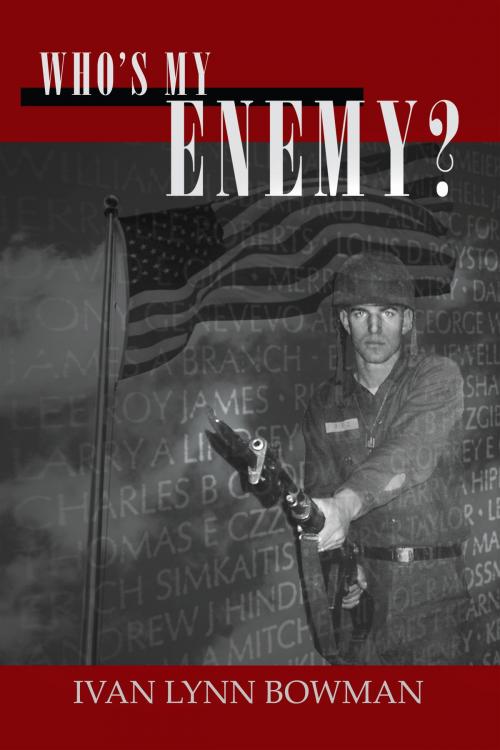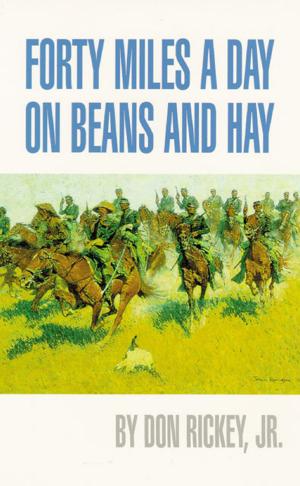Who's My Enemy?
Memories of an American Soldier in Vietnam
Nonfiction, History, Americas, North America, Biography & Memoir, Historical, United States| Author: | Ivan Lynn Bowman | ISBN: | 9781620505212 |
| Publisher: | Bowman's Books | Publication: | June 4, 2012 |
| Imprint: | Language: | English |
| Author: | Ivan Lynn Bowman |
| ISBN: | 9781620505212 |
| Publisher: | Bowman's Books |
| Publication: | June 4, 2012 |
| Imprint: | |
| Language: | English |
Who's My Enemy? Memories of an American Soldier in Vietnam by Ivan Lynn Bowman is not your usual self-published book. It’s confession, catharsis, outrage, and psychotherapy all balled up together into an attack on the status quo. Take a big smart handsome athletic kid from small town northern California timber country, newly married to a beauty queen, ship him off to Vietnam and plunge him into the usual stupid bureaucracy of war, and that’s what you get. After, of course, a few years of berzerk, bar-destroying, babe-abusing, going-broke, bad behavior.
What’s remarkable is that Lynn has remained eloquent, slowly working his way back to sanity without forgetting, denying or repressing much of anything -- or so it seems. While prissy librarians might object (only ten percent of librarians are prissy these days, surely) and NPR programs might feel constrained to warn the sensitive to put their fingers in their ears, there is little enough of the grisly combat stuff. (He only uses the “f” word once and even then puts asterisks in it.) Most people who write about the sorts of things Bowman discusses treat them with a kind of high-jinks MASH-type hilarious contempt. But Lynn keeps on grappling with the sort of moral ambiguities that we all face every day in city halls and high school principal’s offices. Little power-mad guys who have gotten their hands on the well-being of someone vulnerable, greedy guys and gals who think they are better if they have more, and folks who are too scared or inert to pay attention. Don’t shush me! It doesn’t just happen in Vietnam.
You could change very little in this book to have an accurate book about Iraq, I’m guessing. It ought to be tattooed on the butts of all the Neo-cons who thought another war against “little tribal people” would work. It didn’t work for the British, fighting against Americans who had learned from the Indians. Whether it worked for the Americans fighting the Indians, well, the heavy artillery (the bureaucracy) is hard at work but they haven’t won yet. Reinforcements coming from the south.
The strongest theme is the constant bafflement of being in a place where one doesn’t understand the language, the customs, the motives, or the strategies of the people in that place -- except that clearly some of them are trying to kill you -- and then finding that one’s own people are dubious support when they aren’t actively hostile themselves. It’s not the way one’s high school coach said it ought to be.
The next betrayal is discovering that the beauty queen who swore she’d wait for you, who took marriage vows, turns out to be a frail reed when tempted by younger men who were actually present. And what is most hard to survive is realizing not only that one’s body is in a state of revolt -- rashes, diarrhea, itches, weight loss -- but that one slips so easily into self-pity, obsession, and revenge. Then you come back from Vietnam and are attacked as a baby-killer, punished for My Lai without ever seeing combat.
Because Bowman mostly fought the battle of the motor pool, bus-driving through places the Viet Cong might be -- or certainly were -- after him, and got a speeding ticket from his own army for his trouble. His one close scrape was with a vicious old mamasan who went too far and who may or may not have survived. At least he didn’t shoot her. He spent a lot of time doing paperwork and typing up reports. The raids he made were on the kitchens.
My advice is to not read this book at bedtime, not because your head will be full of images of battle, but because you’ll be debating the moral ambiguities all night in your head.
Bowman writes well, with energy and economy. Every chapter has apt epigrams. Illustrations are mostly photos on the scene, with some nice Photoshop double exposures to make a few points. A neat Photoshop trick is to superimpose a computer font version (readable) over the top of his hand-written letters home (not so readable).
He begins and ends with the Vietnam Memorial Wall, which had the kind of powerful effect on him as is often reported. Men break down with the load of memory, but then the feeling of solidarity with so many companions, so many of them named, breaks through. In the end the forgiveness and healing doesn’t come from patriotism or even from family, though that helps. In the end soldiers can only rely on one thing: each other.
The last chapter is a reasoned polemic against the Vietnam War. It’s worth reading. But I think that beyond Bowman’s indictment there is something more, a kind of virus or poison gas in our whole society. What he finds overseas is right here at home when he gets back -- the same narcissism and opportunism, the same valuing of cheap celebration and willingness to abandon stability. So what does a guy like this do? He buys a ranch in Montana. What did you think?
Who's My Enemy? Memories of an American Soldier in Vietnam by Ivan Lynn Bowman is not your usual self-published book. It’s confession, catharsis, outrage, and psychotherapy all balled up together into an attack on the status quo. Take a big smart handsome athletic kid from small town northern California timber country, newly married to a beauty queen, ship him off to Vietnam and plunge him into the usual stupid bureaucracy of war, and that’s what you get. After, of course, a few years of berzerk, bar-destroying, babe-abusing, going-broke, bad behavior.
What’s remarkable is that Lynn has remained eloquent, slowly working his way back to sanity without forgetting, denying or repressing much of anything -- or so it seems. While prissy librarians might object (only ten percent of librarians are prissy these days, surely) and NPR programs might feel constrained to warn the sensitive to put their fingers in their ears, there is little enough of the grisly combat stuff. (He only uses the “f” word once and even then puts asterisks in it.) Most people who write about the sorts of things Bowman discusses treat them with a kind of high-jinks MASH-type hilarious contempt. But Lynn keeps on grappling with the sort of moral ambiguities that we all face every day in city halls and high school principal’s offices. Little power-mad guys who have gotten their hands on the well-being of someone vulnerable, greedy guys and gals who think they are better if they have more, and folks who are too scared or inert to pay attention. Don’t shush me! It doesn’t just happen in Vietnam.
You could change very little in this book to have an accurate book about Iraq, I’m guessing. It ought to be tattooed on the butts of all the Neo-cons who thought another war against “little tribal people” would work. It didn’t work for the British, fighting against Americans who had learned from the Indians. Whether it worked for the Americans fighting the Indians, well, the heavy artillery (the bureaucracy) is hard at work but they haven’t won yet. Reinforcements coming from the south.
The strongest theme is the constant bafflement of being in a place where one doesn’t understand the language, the customs, the motives, or the strategies of the people in that place -- except that clearly some of them are trying to kill you -- and then finding that one’s own people are dubious support when they aren’t actively hostile themselves. It’s not the way one’s high school coach said it ought to be.
The next betrayal is discovering that the beauty queen who swore she’d wait for you, who took marriage vows, turns out to be a frail reed when tempted by younger men who were actually present. And what is most hard to survive is realizing not only that one’s body is in a state of revolt -- rashes, diarrhea, itches, weight loss -- but that one slips so easily into self-pity, obsession, and revenge. Then you come back from Vietnam and are attacked as a baby-killer, punished for My Lai without ever seeing combat.
Because Bowman mostly fought the battle of the motor pool, bus-driving through places the Viet Cong might be -- or certainly were -- after him, and got a speeding ticket from his own army for his trouble. His one close scrape was with a vicious old mamasan who went too far and who may or may not have survived. At least he didn’t shoot her. He spent a lot of time doing paperwork and typing up reports. The raids he made were on the kitchens.
My advice is to not read this book at bedtime, not because your head will be full of images of battle, but because you’ll be debating the moral ambiguities all night in your head.
Bowman writes well, with energy and economy. Every chapter has apt epigrams. Illustrations are mostly photos on the scene, with some nice Photoshop double exposures to make a few points. A neat Photoshop trick is to superimpose a computer font version (readable) over the top of his hand-written letters home (not so readable).
He begins and ends with the Vietnam Memorial Wall, which had the kind of powerful effect on him as is often reported. Men break down with the load of memory, but then the feeling of solidarity with so many companions, so many of them named, breaks through. In the end the forgiveness and healing doesn’t come from patriotism or even from family, though that helps. In the end soldiers can only rely on one thing: each other.
The last chapter is a reasoned polemic against the Vietnam War. It’s worth reading. But I think that beyond Bowman’s indictment there is something more, a kind of virus or poison gas in our whole society. What he finds overseas is right here at home when he gets back -- the same narcissism and opportunism, the same valuing of cheap celebration and willingness to abandon stability. So what does a guy like this do? He buys a ranch in Montana. What did you think?









![Cover of the book Analysis Of The Relationship Between Technology And Strategy And How They Shaped The Confederate States Navy [Illustrated Edition] by Ivan Lynn Bowman](https://www.kuoky.com/images/2014/august/300x300/9781782896067-yTa1_300x.jpg)





